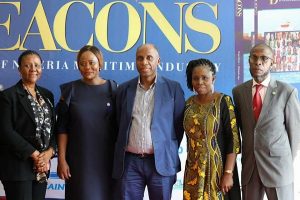
Aggrieved at the impasse the nation reached in its bid to revive a private sector driven national carrier, Nigeria’s Minister of Transportation, Hon. Rotimi Amaechi has revealed why his efforts to ensure the country acquires ocean-going vessels have been futile.
The Minister who was speaking during the book launch of “Beacons Of Nigerian Maritime Industry” yesterday in Lagos, expressed doubt that the problem of vessel acquisition by indigenous players would end anytime soon.

Amaechi lamented that indigenous ship-owners have been unable to source 60% of the finance required to acquire vessels, despite his efforts to get Pacific International Lines (PIL) agree to provide the other 40%.
The Minister also lamented that his effort to get Nigerian ship-owners come together in order to pull resources and agree on the template for the disbursement of CVFF also failed, even as he pointed out the lacuna in requisite laws.

“As the Minister of Transport, I came in with a lot of enthusiasm about the sector, believing that we could create a better environment that would benefit the sector, stakeholders and the nation at large. I have realized that majority of the stakeholders in this sector only want free money. They say they want guarantee for cargoes but there is a law that says; give the opportunities to indigenous operators except in cases where they don’t have the capacity. I thought that after sourcing foreign investors, PIL, with 40%, we would have provided sufficient support to indigenous ship-owners but no ship-owner or group has been able to come with the 60%. I even set-up a committee to find out how they could raise that money but no result has come forward” Amaechi said.

The Minister opined the law which demands Nigerian investors to have 60% should be reviewed, as indigenous investors do not have the capacity to provide such colossal amount.
Also speaking on the non-disbursement of the controversial Cabotage Vessel Financing Fund (CVFF), Rotimi Amaechi said that ship owners must comply with the guidelines for the disbursement of the fund before they can access it.
“CVFF is there for ship owners to access, however, they must meet the requirements for them to access the money. The cost of a vessel is three times much more than the fund. So they must show evidence that they have their part of the contribution before we can make the money available because we can’t make it available to one person. So it is either they come together because it will be difficult to share the money,” he said.
Meanwhile, the Chairperson, Ship-owners Forum, Barr. (Mrs.) Margaret Orakwusi, stressed that the problem wasn’t lack of will to come together but the fact the group couldn’t come up with 60% of the required fund.
“The issue is that the law demands indigenous ship-owners to come up with 60% but that’s huge. The problem has nothing to do with the ship-owners forum but the unavailability of the required fund” she said.
Although several suggestions have been raised on the best ways to utilize CVFF, Orakwusi supported the call for the establishment of a maritime bank with the proceeds of the Cabotage fund to enable ship owners have easy access to fund.
“What the foreign have that we don’t have is access to ship funding. Shipping is funding and whereby these foreigners are able to access funding from their various countries as low as two percent interest rate, how can you compete with them with about 20 percent interest rate?” she said.
Meanwhile, the Head of Department, Mass Communication, University of Lagos (UNILAG) Prof. Abigail Ogwezzy Ndisika who did the book review, commended the authors even as she referred to it as a must-have for all stakeholders in the maritime sector.
However, co-author of the book, Mrs. Hope Orivri noted that the book featured the stories of fifty (50) personalities in the industry who have laid solid foundation for their success and impacting positively on the society.
She said, “As journalists, we have been privileged to hear, observe and write so many stories. But for the stories in this book, we knew that they needed to be documented in a more enduring format of a book that would serve as a reference when they talk about people in this industry for many years to come.”
By Kenneth Jukpor
 MMS PLUS NG – Maritime, Aviation, Business, Oil and Gas News Online Newspaper with coverage in Maritime, Oil and Gas, Aviation, Power and Energy as well as Financial News
MMS PLUS NG – Maritime, Aviation, Business, Oil and Gas News Online Newspaper with coverage in Maritime, Oil and Gas, Aviation, Power and Energy as well as Financial News









